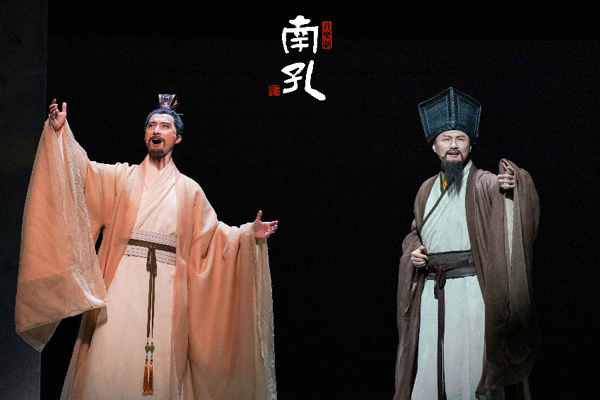Musical featuring Confucius' descendants to make Shanghai debut

The critically acclaimed new musical "Southern Confucianism" will make its Shanghai debut on the stage of the Shanghai Grand Theatre on April 5-6.
The play narrates the story of the descendants of Confucius (551-479 BC), one of China's most famous cultural symbols.
The decree of the Emperor of the Yuan Dynasty (1279-1368) mandated that the southern branch of Confucius' descendants, who had settled in Quzhou in Zhejiang province for a century, return to Qufu, the hometown of Confucius in Shandong province, for ancestral worship in order to rule the country with Confucianism.
To restore the noble dignity of the Confucius family in Qufu, Confucius' grandson in the 53rd generation, Kong Zhu, relinquished the title of "Yansheng Duke" to his younger relative in Qufu and returned to Quzhou to serve the local people.
As the curtain rises on the stage, the book "Southern Confucianism" slowly unfolds. The play is a collaborative creation of the Publicity Department of the Quzhou Municipal Committee of the Communist Party of China and the Zhejiang Performing Arts Group. It is a major stage production and creative work funded by the National Art Fund. Since its debut in August, the musical has been performed nearly 30 times in Hangzhou, Quzhou, Beijing, Xiamen, and other cities, drawing an audience of over 30,000. The two-day performance in Shanghai next week will also launch its national tour across 13 Chinese cities.
The play is divided into two acts. The first act depicts Kong Zhu's aspirations for loving the country and the people. Faced with the changes in his home and the country, he engages in a dialogue with his ancestor, Kong Duanyou, Confucius’s eldest grandson in the 48th generation who moved to South China with a pair of wooden statues of Confucius and finally settled in Quzhou with his wife, to help him make his choices. The second act portrays Kong Zhu's relinquishing the title of "Yansheng Duke" to one of his relatives in Qufu and returning to Quzhou to promote the teachings of Confucius.
The entire production blends modern melodies with ancient compositions, conveying the theme of harmony and the unity of the world through powerful emotional expressions. The transitions of time and space on stage span hundreds of years, giving rise to a "Chinese-style white space expression".
The play features 12 dances, encompassing classical and modern. Director Zhong Hao pushes each actor to perform their best, presenting audiences with a great musical production.
Source: Shanghai Observer